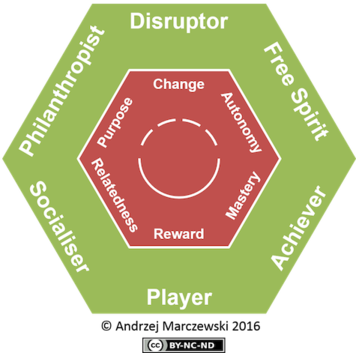Profile-Based Algorithm for Personalized Gamification in Computer-Supported Collaborative Learning Environments
14 Oct 2017 · 3 min read Figure: Marczewski’s (2015) Gamification User Type Hexad
Figure: Marczewski’s (2015) Gamification User Type Hexad
Gamification is a trending topic in both research and commercial applications. However, there has been uncertainity of when and where gamification is effective, and which approaches are suitable different users and environments. Recent studies have proposed that personalization is a key and gamification is not necessarily a one-size fits all method. In this study, we have used the gamification user type hexad (Marczewski, 2015; Tondello et al., 2016), van Roy’s (2017) heuristics for effective gamification design, and Deterding’s (2015) design lenses to create an adaptive gamification system for personalized gamification. The CN2 rule induction machine learning method was used to distill the expert panel created gamification ruleset into a decision-making algorithm. The gamification algorithm matches situations and user types with specific gamification challenges.
The application domain is a computer-supported collaborative learning environment, where software engineering students work together in teams. The aim of the system is to encourage beneficial interactions along the principles of self-determination theory (Deci & Ryan, 2012).
Read More
Read more at the CEUR Workshop Proceedings archive of the Proceedings of the 1st Workshop on Games-Human Interaction (GHITALY 2017) or the preprint at ResearchGate. Alternatively get an overview from the conference presentation slides.
Open Science!
The paper is freely available as open access. Additionally, project materials and source code are available both in GitHub, and permanently archived in Zenodo, the open access research data repository. See links for both below in the references section.
Abstract
In this paper we present an approach for personalizing gamification to the needs of each individual person. We designed the personalization for computer-supported collaborative learning environments by synthesizing three existing design frameworks: the lens of intrinsic skill atoms, gamification user type hexad and heuristics for effective design of gamification. The result of the design process is a context-aware and personalized gamification ruleset for collaborative environments. We also present a method for translating gamification rulesets to machine-readable classifier algorithm using the CN2 rule inducer and a framework for connecting the produced algorithm to collaborative software. Lastly, we present an example software for personalized gamification that was produced by applying the process presented in this paper.
References
Knutas, A., van Roy, R., Hynninen, T., Granato, M., Kasurinen, J., & Ikonen, J. (2017). Profile-Based Algorithm for Personalized Gamification in Computer-Supported Collaborative Learning Environments. In Proceedings of the 1st Workshop on Games-Human Interaction (GHITALY 2017). (CEUR-WS | Preprint from ResearchGate)
Knutas, A., van Roy, R., Hynninen, T., Granato, M., Kasurinen, J., & Ikonen, J. (2017, September 18). Online Appendix for “Profile-Based Algorithm for Personalized Gamification in Computer-Supported Collaborative Learning Environments”. Zenodo. http://doi.org/10.5281/zenodo.827225
Authors
External References
Deci, E. L., & Ryan, R. M. (2012). Motivation, personality, and development within embedded social contexts: An overview of self-determination theory. The Oxford Handbook of Human Motivation, 85–107.
Deterding, S. (2015). The Lens of Intrinsic Skill Atoms: A Method for Gameful Design. Human–Computer Interaction, 30(3–4), 294–335.
Marczewski, A. (2015). User Types. In Even Ninja Monkeys Like to Play: Gamification, Game Thinking and Motivational Design (1st ed., pp. 65-80). CreateSpace Independent Publishing Platform.
Tondello, G. F., Wehbe, R. R., Diamond, L., Busch, M., Marczewski, A., & Nacke, L. E. (2016). The Gamification User Types Hexad Scale. In Proceedings of the 2016 Annual Symposium on Computer-Human Interaction in Play (pp. 229–243). New York, NY, USA: ACM.
Roy, R. van, & Zaman, B. (2017). Why Gamification Fails in Education and How to Make It Successful: Introducing Nine Gamification Heuristics Based on Self-Determination Theory. In M. Ma & A. Oikonomou (Eds.), Serious Games and Edutainment Applications (pp. 485–509). Springer International Publishing.